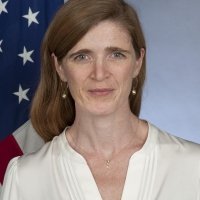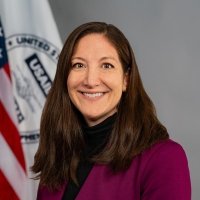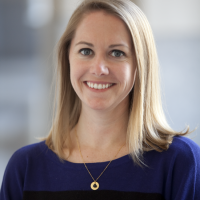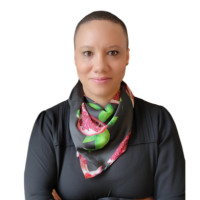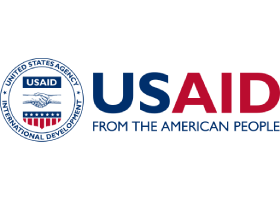Good morning, everyone. Samantha, welcome to our side of the house. We're in the same neighborhood but we don't get together nearly often enough.
When USAID reached out to us and asked us if we would be willing to host this with them, I was quick to say “yes.” Two reasons. Number one, I am biased. I think USAID is the world’s premier development and humanitarian response agency. Number two, and I’ll put it less nicely than Lauren did – I'm an old democracy guy, right? I actually believe in this work, and my democracy time goes back a long way.
I began my foreign policy career as a teacher in a village in Kenya. The year that I was there was the year of the controversial queuing elections, where they would hold up photographs of the candidates and you would line up behind the candidate of your choice. My school was, in fact, a polling place. I remember watching the lines going back and forth, and then right around closing time, one line figured out the other one was going to win and so they all went to the winning line – it was unanimous!
The next day when we were back in class, one of my Kenyan colleagues came up to me and he said, “What did you think of our elections?” I said they struggled a little bit. And he said, “You know, it's not perfect...but at least we are counting heads and not breaking them.”
Several years later, in 2014, I was just taking the helm at IRI. I am biased, but I think it’s one of the world’s great democracy organizations. Isn’t that right Kimber! My very first project for IRI was to travel with Madeline Albright to Ukraine to serve as an election monitor for the first post-Euromaidan elections. Two things I will always remember from that experience: I will remember talking to election commissioners who said to us, “You know the night before the voting, almost all of us received anonymous text messages saying, ‘We know where you live.’” I also remember going to a polling place in Kiev to watch it open. I got there; it was a crowded room. When it finally opened, the first guy in line was an old guy. He had a walking stick and he sort of struggled up there, posted his ballot, turned to us and said “Democracy!”
The following year, I’m an election observer in Burma. 2015 – the first openly contested elections there in 25 years. I watched millions stand in line – young and old, under the hot sun – making sure that they would vote. And of course, the NLD won in a landslide. I remember driving back to Yangon, the capital, and we stopped to get gas. The driver was going back in to pay, and he said, “Yeah, you need to go inside. They want to talk to you.” I thought, “What’s happening here?” Then I go in, and there are two young ladies serving tea and they said, “You’re an American. Thank you.”
And just two years ago, Ken Wallach and I served as co-chairs of Westminster 2.0 – The Reagan Institute's project to update and modernize Reagan’s historic speech which launched the democracy movement here in the US. What was rewarding about that was to see the response, and the people offering their ideas. Republican, Democrat, conservative, liberal – it did not matter – everyone believes in this work.
I’m sometimes dismayed when I hear people say that democracy is in decline. They’re missing the point. Just ask that old man. Democracy is not in decline. It's in need of liberation. That’s why this DRG policy matters. That’s the work that we’re called upon to do.
You all know, I believe with all my heart in the Journey to Self-reliance. I believe in helping every community in every country to lead their own future. You can’t get there if you don’t have citizen-centered, citizen-responsive governance at the heart of that work.
As the policy notes, democratic countries are better partners. They tend to be more prosperous and stable. They’re less likely to wage war or drive human displacement. That makes it all in our interest, too. Don’t forget, as we’re gathering here to talk about this great policy, understand that autocratic regimes are gathering as well. They have their own playbook – it's a little bit different than what we have. But we are not in this alone...there’s competition, and its ruthless competition.
There are many challenges to this work, and we all know that. There always has been, always will be. It’s going to require creativity, innovation, and entrepreneurship. It’s going to require patience and persistence. Guess what? You’re up to it. It absolutely matters.
Again, I’m honored for all of us to be able to host you here and I’m honored to see this policy come to life.
We all have work to do. Thank you.
